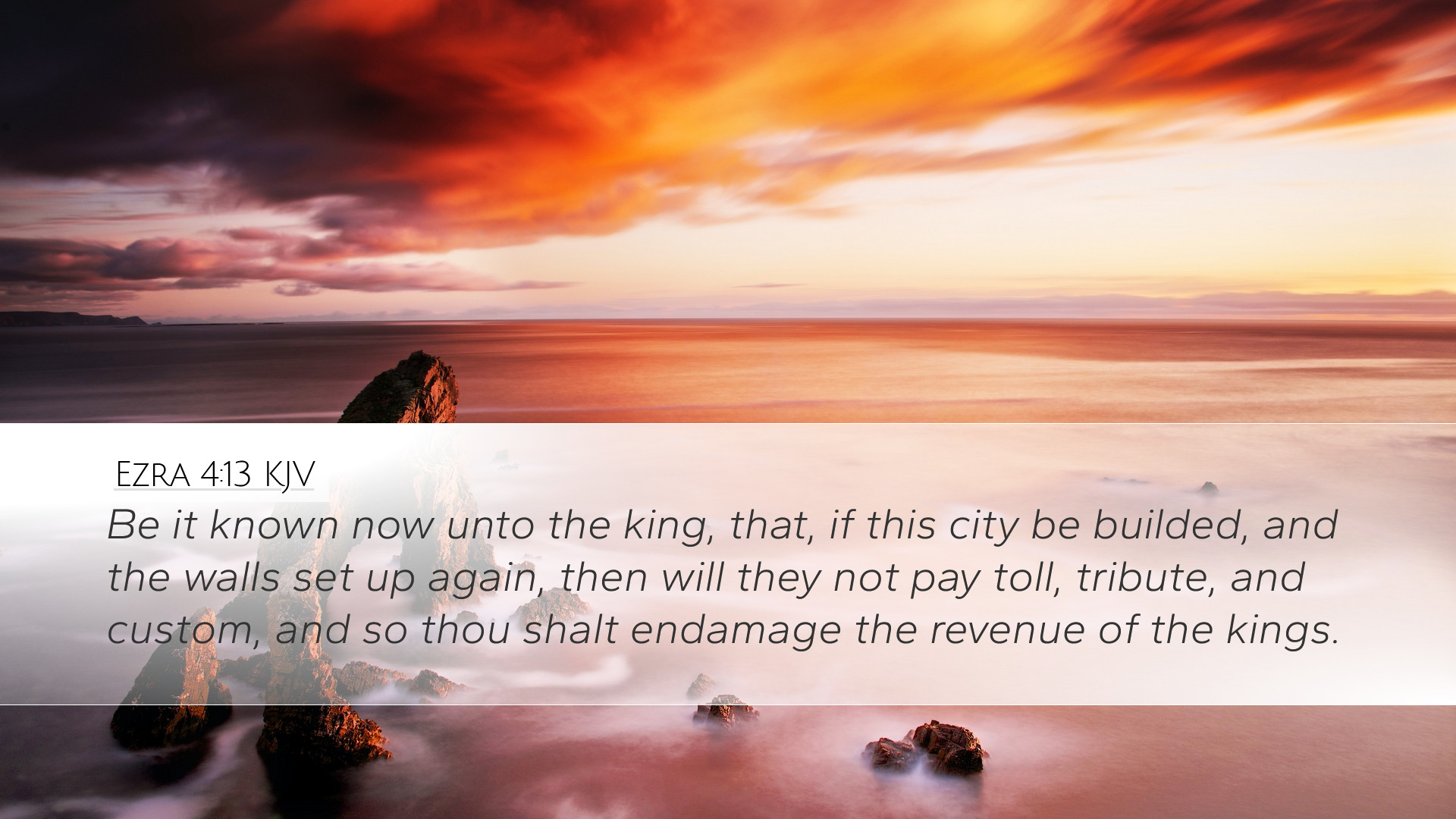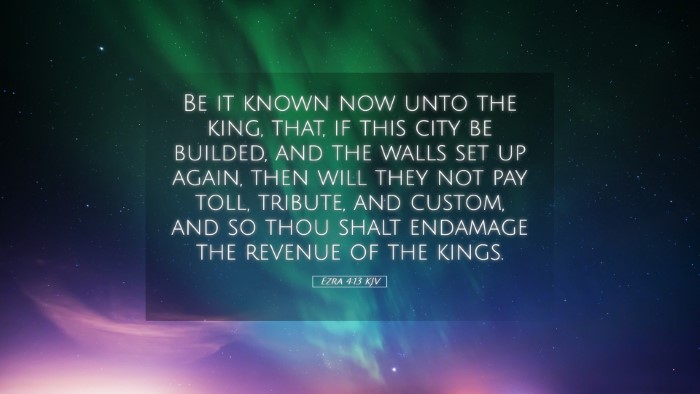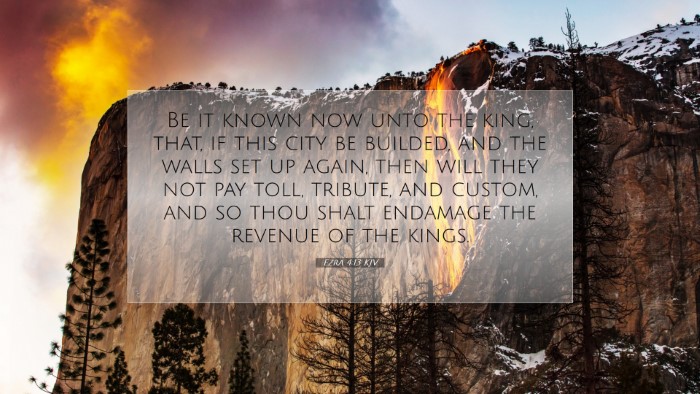Old Testament
Genesis Exodus Leviticus Numbers Deuteronomy Joshua Judges Ruth 1 Samuel 2 Samuel 1 Kings 2 Kings 1 Chronicles 2 Chronicles Ezra Nehemiah Esther Job Psalms Proverbs Ecclesiastes Song of Solomon Isaiah Jeremiah Lamentations Ezekiel Daniel Hosea Joel Amos Obadiah Jonah Micah Nahum Habakkuk Zephaniah Haggai Zechariah MalachiEzra 4:13
Ezra 4:13 KJV
Be it known now unto the king, that, if this city be builded, and the walls set up again, then will they not pay toll, tribute, and custom, and so thou shalt endamage the revenue of the kings.
Ezra 4:13 Bible Commentary
Commentary on Ezra 4:13
Ezra 4:13 reads: "Be it known unto the king that the Jews which came up from thee to us are come unto Jerusalem, building the rebellious and bad city, and have set up the walls thereof, and joined the foundations."
This verse comes during a period of opposition to the rebuilding of Jerusalem. It highlights the context of political tension between the returning exiles and the governing authorities. Various commentaries provide insights into the implications of this verse for both its original audience and for contemporary readers.
Contextual Overview
The background of Ezra 4 involves the return of exiles from Babylon after the decree of Cyrus. Under Nehemiah's leadership, the people began to rebuild the destroyed city. However, their efforts were met with hostility from neighboring nations who perceived the restoration of Jerusalem as a threat to their power.
Insights from Commentaries
Matthew Henry's Commentary
Matthew Henry emphasizes the importance of understanding the phrase "rebellious and bad city." This description reflects the attitude of the adversaries towards Jerusalem. Henry notes that the accusations against the Jews reveal the inherent fear of those in authority. The rebuilding of Jerusalem was seen not just as a physical restoration, but as a potential political uprising which threatened the existing power dynamics.
Albert Barnes' Notes on the Bible
Albert Barnes offers a focused interpretation of the term "the king." He argues that the reference to the king signifies not just immediate authorities, but implicates a larger political structure that was often hostile to the people of Israel. Barnes discusses how such proclamations were tactical moves by the adversaries to manipulate political sentiments. He further explains that the building of walls was not merely an act of restoration but also a statement of national identity and defiance.
Adam Clarke's Commentary
Adam Clarke provides historical and cultural context, indicating that the enemies of the Jews intended to sway the king's sentiments by exaggerating the situation in Jerusalem. Clarke elaborates that the builders were portrayed as insurrectionists, highlighting the serious threat their rebuilding posed to local governance. He also points to the theological underpinnings of the situation, suggesting that the Lord's favor was upon those who sought to rebuild, irrespective of the slander they faced. Clarke stresses that the rebuilding efforts illustrate God's promises being fulfilled in the face of opposition.
Theological Implications
This verse serves as a profound reminder for pastors and theologians about the continuous struggle for identity in the light of governance and social opposition. It raises questions about the nature of authority and the faithful response of God's people to surrounding challenges.
- Contrast between divine assignment and worldly opposition: The endeavors of the Jewish exiles illustrate faithfulness despite external pressures. Their accused ‘rebellion’ is seen in the light of obedience to God rather than defiance of earthly rulers.
- Restoration and Identity: The rebuilding of Jerusalem is a central theme not just in Ezra but throughout scripture. Such restoration symbolizes the covenant faithfulness of God towards His people, providing theological ground to explore God's enduring relationship with individuals and nations.
- The Function of Opposition: Observing the narrative, one could conclude that opposition is often a catalyst for growth. The tension the Jews faced amplified their reliance on divine support, portraying a model for believers who encounter resistance while pursuing their callings.
Concluding Thoughts
Ezra 4:13 encapsulates a critical juncture in Israel's history, reflecting both the challenges and the faithfulness of God's people. The insights from Matthew Henry, Albert Barnes, and Adam Clarke collectively inform our understanding of this verse, providing a multi-dimensional view of perseverance amid adversity. For contemporary scholars, pastors, and students, this text remains relevant in the exploration of faith's resilience in the face of sociopolitical strife.


